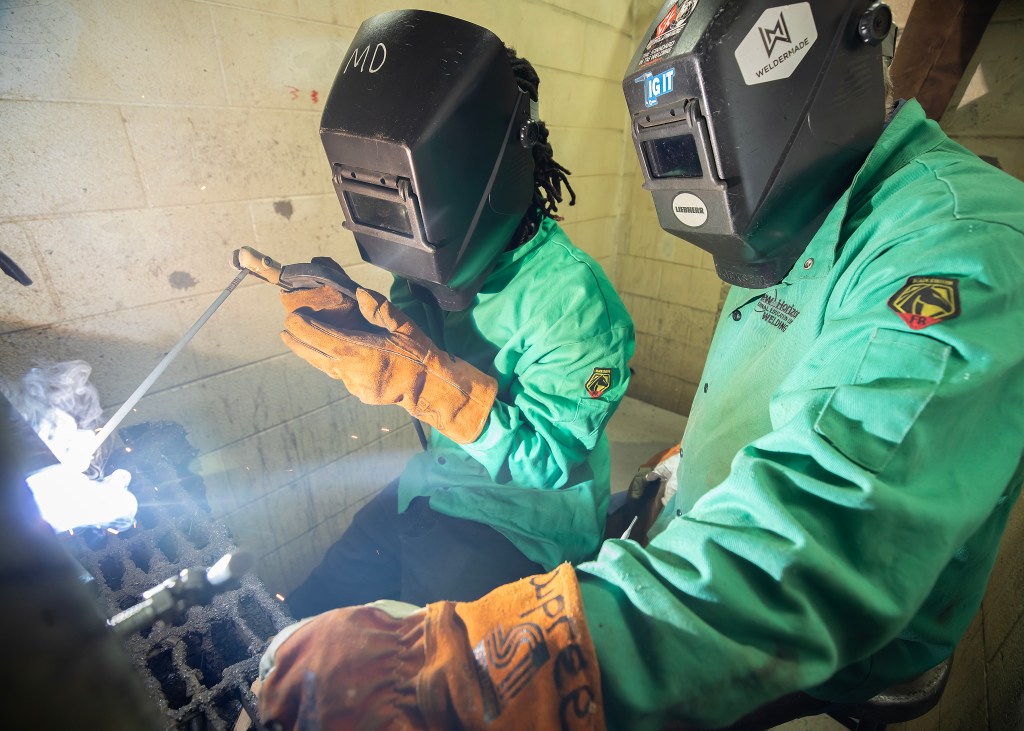Graduation is a time of celebration for students as they complete their educational journey, but for some students it brings the added challenge of what to do next.
Students with special needs or disabilities may find the job search more difficult due to transportation issues, needing accommodations to complete some tasks, or lacking the social skills to thrive in a job interview.
According to the Bureau of Labor Statistics, the unemployment rate for people with disabilities (7.2%) is more than twice the rate for people without disabilities (3.5%), but for young adults, the number is even higher, sometimes reaching 70%.
In K-12 education, students with disabilities are identified through a 504 plan (accommodations in the general education classroom) or an IEP (specially designed instruction) to help ensure their disability does not adversely affect their education. Students receive services determined by their specific needs, and if they go on to college, their IEP carries over. Public schools provide services to students with disabilities until they turn 22 or earn a standard diploma.
BethAnne Klaver is a project specialist at the College of William and Mary’s Training and Technical Assistance Center, part of a statewide network run by the Virginia Department of Education with ADA funding. TTAC staff provide professional development services to educators across Eastern Virginia.
Claver said transition planning for students with IEPs begins with a transition assessment and interagency collaboration the year they turn 14. Topics in the process include career exploration, post-high school education and training, workplace readiness training to build social and independent living skills, and self-advocacy.
“Transition plans focus not only on work but also on independent living and community participation,” she said, “often connecting students and their families to a variety of outside services based on preferences and needs, and most importantly, listening to what types of supports they need.”
One unique facility in Virginia is the Wilson Workforce and Rehabilitation Center near Staunton, Claver says. Once a veterans’ center, the state school now has programs for everyone and offers vocational assessments, training, and a school-to-work transition program called Postsecondary Education Rehabilitation Transition (PERT).
There are many more partnerships in the community, including the College of William and Mary, The Arc of Greater Williamsburg, and VersAbility Resources.
“Our tagline is, ‘When the school bus stops coming, The Ark is there,'” says Pam McGregor, executive director of The Ark. “We’re always hoping to get involved with families earlier, before their loved one turns 21 and can no longer attend special education. We can share some strategies and help them make a plan before that fateful day arrives,” she says.
 Participants in the Ark of Abilities Day program work at Pet Supplies Plus. Courtesy of The Ark of Greater Williamsburg
Participants in the Ark of Abilities Day program work at Pet Supplies Plus. Courtesy of The Ark of Greater Williamsburg
The Arc of Abilities day program works with local organizations to match clients with jobs and provide transportation to and from work.
“Our partnerships with Windsor Mead and Williamsburg Landing in particular were fostered due to the high turnover rates for entry-level positions,” McGregor says. “Clients with the ability to work in these positions, along with the added benefit of reliable transportation that Arc provides, create a win-win situation. Many of Arc’s clients continue on in their employment and become valued employees, some of whom have even been named Employee of the Month.”
VersAbility Resources, which serves many communities in Hampton Roads, has implemented a program called the “Future of Work” program to address employment barriers faced by people with disabilities. Job coaches help people with disabilities successfully complete certification, certification and apprenticeship programs.
“Our job coaches will work with you on-site throughout your training. They will prepare you by strengthening your work readiness skills related to communication, anxiety and teamwork, and help you to successfully complete the training programme,” said Paul Hardy, senior HR recruiter at VersAbility.
Examples of opportunities include jobs in healthcare, skilled trades, and culinary service. Welding graduates will earn a certificate and be eligible for American Welding Society Steelworks Certification. Arts graduates will be eligible to earn ServSafe certification, and Medical Administrative Assistant graduates will be eligible to earn Virginia Medical Administrative Assistant Certification.
Hardy said job coaches can help with resume writing and interview preparation, as well as ensure that training sessions are given the right attention.
And at the College of William & Mary, the Next Move project supports youth and young adults with developmental disabilities with guided summer internship experiences on campus, launched in 2018. Jobs include dining, library and facilities management.
The School of Education pairs each intern with an on-site job training coach. In the mornings, interns receive job and social skills instruction and in the afternoons they work in on-campus jobs.
Natalie Miller Moore, [email protected]

